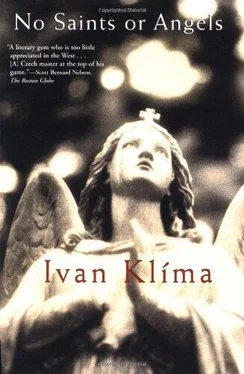I've often seen them hanging there, though I knew I was only imagining it.
1
Today it was announced that we have a 25 per cent ozone deficit above our heads and I was summoned to my daughter's school. The school is less than fifteen minutes' walk away Some of the teachers and the principal herself are among my patients. Jana's class teacher isn't one of them, but fortunately she doesn't teach maths or chemistry. She teaches Czech. According to Jana she's known as 'the nun'. This lady in rather old-fashioned black clothes must be even older than I am. She has long hair, completely white, and a fine complexion, undamaged by smoking and possibly untouched by kisses. She really does have the spin-stery complexion of a nun. She gazes at me with mournfully reproachful eyes. 'I'm worried about Jana.'
'I know, so am I.'
'My colleagues complain about her. She has stopped studying and her marks have dropped in all subjects. In English and maths as much as two grades, in fact. And my experience with her is similar.'
I nod. I ought to say something in my own and Jana's defence. Or at least explain that I don't have enough time or energy what with my patients and my elderly mother. That my daughter is pubertal and enjoys loafing around at night and singing morbid songs. I can ban her from those but I can't make her want to study. 'Do you think there is any chance of improving things at the last moment?'
'Well, it's getting very close to the final call, so she'd have to get a move on,' she says with the sort of gravity employed when talking about an operation on a hopeless case. 'And then there are all her absences,' she says, continuing her indictment. 'Is she really ill so often these days?'
I flinch. 'What do you mean?'
She takes out the class register and reads to me from it. Over the past two months, once absent for three days, then for two days, three times for one day, and classes missed twice, either maths or chemistry. 'The excuse notes are all from you, Mrs Pilná. As you are in the medical profession I didn't ask for any other confirmation. But I'd simply like to reassure myself that Jana is really so sickly.'
A marvellous word, 'sickly'. Perfect for a language teacher with the appearance of a nun. I won't tell her that Jana is as fit as a fiddle. I wonder whether I ought to support Jana and her forged excuse notes and then give the minx a good hiding when she gets home, a whack on her bare backside for each signature she forged. 'She suffers from migraines,' I say hesitantly. 'She takes after me. And she also had the flu.'
'But those illnesses don't account for why she's so much weaker in all her subjects.'
I agree.
'Have you not noticed anything suspicious about her behaviour?'
I ask her what she means.
She tells me that there are twelve children in the school who are known to be taking drugs. One third-year boy is receiving treatment in the mental hospital at Bohnice. She says it is hard to say how many others there might be.
'That's dreadful,' I say. 'But I've not noticed anything.'
'They are past masters at concealing it,' she says, clearly unconvinced. 'That's something they are good at learning and the more they have to conceal the more resourceful they become.'
She goes on to quote statistics that I know anyway. 'You see, Mrs Pilná, dealers nowadays stand waiting right outside the school
gates.' She points towards the window, beyond which no one is to be seen. 'But there is nothing we can do. After all, we live in a free country and the pavement is a public area. Selling drugs is an apparently normal business activity. And often they don't even sell them; they let the children have free samples. Children are curious and they like to appear grown-up. Or rather, as bad as grown-ups.'
'I'm sure that Jana. .' I shake my head, trying to convince myself. 'She loafs around, I know, but she would be scared of drugs.'
'I hope so,' says her class teacher. I can't tell whether the tone in her voice is severe or conciliatory. 'Her father is a teacher and an athlete.'
'Her father's ill at present,' I say. 'Very ill. He has neither the time nor the energy for her. Besides, you are aware that. .'
Of course she's aware. Almost half the kids in her class are in the same boat. But fathers can exercise some influence, even when they live elsewhere. The teacher talks for a while about how parents pay insufficient attention to their children: at the age when they are at greatest risk children spend their time either in some gang or in front of the TV, where they gawp at serials about heroes who could only appeal to people in a trance or a drug-induced state.
That was how my dad used to speak. She hasn't yet got round to complaining that young people lack an ideal, a great goal for all to strive for. Except that my father's words were full of bitterness and imbued with the idea that the human herd has to be driven along a single road to a single destination, chosen for it by those who know where paradise is to unfold. The teacher is speaking about a problem she actually has to deal with, and her words fill me with alarm.
I simply say, although there is little point, that Jana doesn't watch television and actually disdains those who waste their time on it. Then I make the usual parental promise that I will talk to her. As if I didn't spend my time talking to her about the same thing.
'Please do. Together we'll come up with something, you'll see. After all, she's a clever and gifted girl,' she says in conclusion, although she really thinks she's a little brat. And she's right.
I leave the school building and all of a sudden I feel almost too tired to walk home. Maybe it's on account of that hole in the ozone layer, or maybe it's all too much for me. I spend eight hours a day in the dental surgery, half an hour to work and the same home, and the trip by dismal metro and packed bus is enough to sap all one's strength and undermine one's mental resolve. Not to mention what I have to do at home to keep us going. And if I give Jana a chore to do, the way she does it means I have to do it again after her.
There was a time when I used to read something or listen to music. These days I no longer do that for pleasure but from fear of leading an animal existence. Not long ago I fell asleep at a concert, and on the odd occasions I read a novel, by the time I get to the end I can't remember how the thing started.
For God's sake, why is everything up to me now?
I drag myself as far as the little square in front of Capek's villa. I can't resist sitting down on the low perimeter wall. No one notices me, apart from a dog in the house opposite who starts to bark. So I'm well, but just a bit pooped, my writer wrote to his dear Olga.
Not many people read Capek these days. He's not an American writer.
As I approach our house I notice the familiar figure of the thin young man with the red hair: Jan, I can't remember the rest of his name, that ex-student of my one and only husband. But his Christian name is like our daughter's. What is he doing here? He can't be waiting for me, surely.
Now he has noticed me and is walking to meet me.
But I have no time for him. I need to talk to my unruly daughter and discover how she's been spending her time while playing truant.
The young man makes a slight bow and apologizes for waylaying me: he simply wanted to ask how his old teacher was. He rang the bell of our flat but no one was home, so he decided to wait for a while.
'There was no one in?' I ask foolishly.
No one, he repeats.
I tell him that I don't know how my ex-husband is; I haven't spoken to him since the time I visited him in hospital. I offer to give the young man Karel's phone number, but he has it already. He doesn't want to ask him directly, only to know his actual state of health.
Читать дальше












